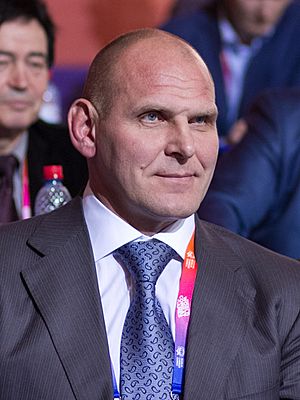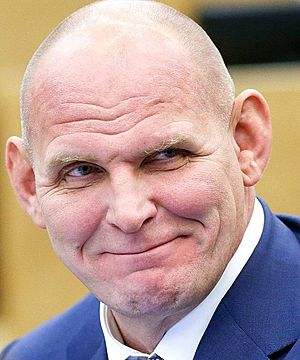Aleksandr Karelin facts for kids
Quick facts for kids
Aleksandr Karelin
|
|
|---|---|
|
Александр Карелин
|
|

Karelin in 2013
|
|
| Russian Federation Senator from Novosibirsk Oblast |
|
| Assumed office 25 September 2020 Serving with Vladimir Gorodetsky
|
|
| Preceded by | Vladimir Laptev |
| Member of the State Duma for Novosibirsk Oblast |
|
| In office 5 October 2016 – 15 September 2020 |
|
| Preceded by | constituency re-established |
| Succeeded by | Alexander Aksyonenko |
| Constituency | Iskitim (No. 137) |
| In office 18 January 2000 – 29 December 2003 |
|
| Preceded by | Arkady Yankovsky |
| Succeeded by | Anatoly Lokot |
| Constituency | Zayeltsovsky (No. 126) |
| Member of the State Duma (Party List Seat) |
|
| In office 29 December 2003 – 5 October 2016 |
|
| Personal details | |
| Born | 19 September 1967 Novosibirsk, Russian SFSR, Soviet Union |
| Political party | United Russia Unity (until 2001) |
| Education | Omsk State Institute of Physical Culture Saint Petersburg State University (D.Sc.) |
| Personal information | |||||||||||||||||||||||||||||||||||||||||||||||||||||||||||||||||||||||||||||||||||||||||||||||||||||||||||||||||||||||||||||||||||||||||||||||||||||||||||||||||||||||||
|---|---|---|---|---|---|---|---|---|---|---|---|---|---|---|---|---|---|---|---|---|---|---|---|---|---|---|---|---|---|---|---|---|---|---|---|---|---|---|---|---|---|---|---|---|---|---|---|---|---|---|---|---|---|---|---|---|---|---|---|---|---|---|---|---|---|---|---|---|---|---|---|---|---|---|---|---|---|---|---|---|---|---|---|---|---|---|---|---|---|---|---|---|---|---|---|---|---|---|---|---|---|---|---|---|---|---|---|---|---|---|---|---|---|---|---|---|---|---|---|---|---|---|---|---|---|---|---|---|---|---|---|---|---|---|---|---|---|---|---|---|---|---|---|---|---|---|---|---|---|---|---|---|---|---|---|---|---|---|---|---|---|---|---|---|---|---|---|---|---|
| Height | 6 ft 3 in | ||||||||||||||||||||||||||||||||||||||||||||||||||||||||||||||||||||||||||||||||||||||||||||||||||||||||||||||||||||||||||||||||||||||||||||||||||||||||||||||||||||||||
| Weight | 286 lb | ||||||||||||||||||||||||||||||||||||||||||||||||||||||||||||||||||||||||||||||||||||||||||||||||||||||||||||||||||||||||||||||||||||||||||||||||||||||||||||||||||||||||
| Sport | |||||||||||||||||||||||||||||||||||||||||||||||||||||||||||||||||||||||||||||||||||||||||||||||||||||||||||||||||||||||||||||||||||||||||||||||||||||||||||||||||||||||||
| Country | |||||||||||||||||||||||||||||||||||||||||||||||||||||||||||||||||||||||||||||||||||||||||||||||||||||||||||||||||||||||||||||||||||||||||||||||||||||||||||||||||||||||||
| Sport | Wrestling | ||||||||||||||||||||||||||||||||||||||||||||||||||||||||||||||||||||||||||||||||||||||||||||||||||||||||||||||||||||||||||||||||||||||||||||||||||||||||||||||||||||||||
| Event(s) | Greco-Roman | ||||||||||||||||||||||||||||||||||||||||||||||||||||||||||||||||||||||||||||||||||||||||||||||||||||||||||||||||||||||||||||||||||||||||||||||||||||||||||||||||||||||||
| Club | Dynamo Novosibirsk | ||||||||||||||||||||||||||||||||||||||||||||||||||||||||||||||||||||||||||||||||||||||||||||||||||||||||||||||||||||||||||||||||||||||||||||||||||||||||||||||||||||||||
| Coached by | Viktor Kuznetsov | ||||||||||||||||||||||||||||||||||||||||||||||||||||||||||||||||||||||||||||||||||||||||||||||||||||||||||||||||||||||||||||||||||||||||||||||||||||||||||||||||||||||||
| Retired | 2000 | ||||||||||||||||||||||||||||||||||||||||||||||||||||||||||||||||||||||||||||||||||||||||||||||||||||||||||||||||||||||||||||||||||||||||||||||||||||||||||||||||||||||||
|
Medal record
|
|||||||||||||||||||||||||||||||||||||||||||||||||||||||||||||||||||||||||||||||||||||||||||||||||||||||||||||||||||||||||||||||||||||||||||||||||||||||||||||||||||||||||
Aleksandr Aleksandrovich Karelin (born September 19, 1967) is a famous Russian politician and a retired athlete. He is known as one of the greatest Greco-Roman wrestlers of all time.
Karelin competed in Greco-Roman wrestling for the Soviet Union and Russia from 1986 to 2000. People called him the "Russian Bear", "Russian King Kong", and "Alexander the Great". He won three gold medals at the Olympic Games in 1988, 1992, and 1996. He also won a silver medal at the 2000 Olympics.
His wrestling record was amazing: 887 wins and only two losses. Before his final Olympic match in 2000, no one had scored a point against him for six years! He won nine gold medals at the World Wrestling Championships without ever losing a match. He also carried his country's flag at three Olympic Games.
Because of his incredible success, the International Federation of Associated Wrestling Styles (FILA) named him the greatest Greco-Roman wrestler of the 20th century. He was also one of the first ten people to join the FILA International Wrestling Hall of Fame in 2003.
Karelin became a politician in 1999. He was elected to the State Duma, which is like a parliament, and served there until 2020. After that, he became a senator in the Federation Council.
Contents
Wrestling Career Highlights
Karelin was a big baby, weighing about 12 pounds when he was born. He loved reading and math in school. He started wrestling training in 1981 with Viktor Kuznetsov, who was his coach for his entire career. He tried other sports like boxing and weightlifting, but wrestling was his true calling.
By age 13, he was already tall and strong. He grew very fast and competed in the super heavyweight division from age 16. In 1985, he won a junior world title. He also won gold at the Friendship-84 as a junior.
Karelin had his first senior-level loss in 1987, but it was a close and debated match. He then went on to win 13 national championships in the USSR, CIS, and Russia. These championships were very tough, sometimes even harder than the European or World Championships.
Olympic Gold Medals
At the 1988 Olympics, Karelin won his first gold medal. He used his special move, the Karelin Lift, to win the final. He was only 21 years old, making him the youngest super heavyweight Olympic champion in Greco-Roman wrestling.
In 1992, at the Barcelona Olympics, Karelin won one of the fastest wrestling matches ever. He pinned his opponent in just 14 seconds! At the 1996 Atlanta Olympics, he won another gold medal, even though he had recently had shoulder surgery.
His Only Senior Losses
Karelin was undefeated for 13 years in international competitions. He also went six years without anyone scoring a single point against him. This amazing streak ended at the Sydney Olympics final. He lost 0-1 to Rulon Gardner from the United States. This loss is considered one of the biggest upsets in sports history.
His only two losses at the senior level were in finals, both by just one point. Some people, like former wrestler Tuomo Karila, believe that Karelin should have won the match against Gardner. Overall, his senior record was an incredible 887 wins and only 2 losses.
Karelin holds the record for the most world-level gold medals in men's Greco-Roman wrestling, with 12. He also shares the record for the most world-level medals overall, with 13.
Training and Wrestling Style
Karelin was known for his incredible strength. He competed in the heaviest weight class, around 286 pounds. His coach helped him become very strong and skilled. Karelin could do 42 pull-ups! He was so dominant that people called him "The Experiment."
He trained like a "madman," as he described it. His daily routine included hours of rowing and long runs through the forest, sometimes carrying a large log on his back. He also lifted heavy weights, like doing 10 reps of 440 pounds in Zercher deadlifts. Despite his size, he was very flexible and could even do backflips. When asked about his toughest opponent, he joked it was his refrigerator, which he once carried up eight flights of stairs!
The Karelin Lift
Karelin was famous for his special move called the "Karelin Lift." In this move, his opponent would lie flat on the mat to avoid being thrown. Karelin would then lift his opponent high into the air, spin them around, and slam them down onto the mat. This move was incredibly hard to do, especially against heavy opponents. It earned him the maximum 5 points in Greco-Roman wrestling. His long arms and powerful grip, described as being like an "anaconda," helped him perform this amazing throw.
Injuries and Recovery
Like many top athletes, Karelin had several serious injuries during his career. He broke his leg at age 15. In 1993, he won the World Championships even after breaking two ribs in his first match. In 1996, he tore a major muscle in his chest. Doctors thought he wouldn't be able to use his right hand for months. But Karelin still won the European Championships and then the Olympics three months later!
Political Career
After his wrestling career, Karelin entered politics. From 1995 to 1999, he worked with the Russian tax police. In 1999, he was invited by Vladimir Putin to join politics. He became a member of the United Russia party.
He was elected to the State Duma, Russia's parliament, in 1999 and 2003. He represented the Novosibirsk region. In 2007, he was elected again, representing another region. He worked on international affairs in the Duma. In 2020, he became a senator in the Federation Council, representing the Novosibirsk region. He is still a member of the council's committee on International Affairs.
Personal Life
Karelin studied at several universities, including the Siberian Academy of Physical Culture and Saint Petersburg University. He has degrees in sports and law. He even has a PhD about wrestling techniques!
His father was a truck driver and an amateur boxer. Karelin is married to Olga, and they have two sons, Denis and Ivan, and a daughter, Vasilisa. His son Ivan also wrestles in the superheavyweight division, coached by Karelin's old coach, Viktor Kuznetsov. His daughter Vasilisa is a rhythmic gymnast.
Karelin is an Orthodox Christian. He is also very interested in music and literature. He served in the Internal Troops of the USSR and Russia, where he also became a champion in sambo, another type of martial art.
Legacy and Awards
Karelin is considered one of the most dominant and greatest athletes of all time. He is remembered for his strength, skill, and intimidating presence. Other famous wrestlers, like Rulon Gardner, have called him the best wrestler ever.
Rulon Gardner, who famously defeated Karelin in 2000, said:
Karelin - God. He was and will remain the best fighter. True, some now think that I am the best. But I'm just an Olympic champion. And I will go down in history not as Rulon Gardner, but as the winner of Karelin.
Karelin received many awards for his achievements. He was named a Hero of the Russian Federation in 1996, which is a very high honor in Russia. He also received several other important awards and medals. Since 1992, an annual wrestling competition is held in his honor in his hometown of Novosibirsk.
See also
 In Spanish: Alexandr Karelin para niños
In Spanish: Alexandr Karelin para niños


